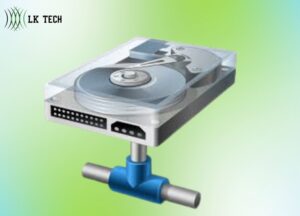How Saving Important Business Documents to a Network Drives Can Protect Your Data
As a business owner, losing important files and documents can be disastrous. That's why today's helpdesk tip is to save your critical business files to a network drive instead of locally on your computer's hard drive.

- Protect Your Data by Save Business Files to Network Drives
Why Network Drives are More Secure for Business Data Protection
Network drives are storage locations on a business's server or in the cloud. They have key advantages over local hard drives for securing your business data:
- Automatic backups: Network drives are typically set up to back up files on a schedule, like nightly or weekly. This ensures that even if the original files are lost or corrupted, there are backup copies that can be easily restored. Local hard drives rarely get backed up which puts data at much higher risk of permanent loss. If a local hard drive fails or a file is accidentally deleted, it could be gone for good if no backup exists.
- Access from anywhere: Users can access files on network drives remotely, from any internet-connected device. Local hard drive files can only be accessed from that one computer where they are stored, which severely limits productivity if employees need files while away from their desk. With network drives, employees can securely access work files from home, client sites, smartphones and laptops while traveling, and any other location with internet access. This enables continuous productivity.
- Shared access: Network drives allow multiple authorized users to collaborate on documents and files simultaneously. Local hard drives only allow one user at a time to access files, making collaboration, sharing, and team productivity extremely difficult. With network drives, teams can seamlessly edit shared files like legal contracts, account documents, product designs, and presentations together without risking version control problems.
- Disaster recovery: If a local hard drive fails or a computer is compromised by a virus or malware attack, those local files have a high chance of being lost for good. However, files stored on network drives can be easily restored from recent backups for reliable disaster recovery. This provides an invaluable safeguard against data loss disasters.
In summary, network drives provide automatic backup protection, 24/7 accessibility from anywhere, seamless collaboration, and disaster recovery protections that local hard drives simply cannot offer. For any business that values its data, network drives are exponentially more secure options than local computer hard drives.
What Types of Business Files Should Be Saved to Network Drives
Any business-critical files and documents that would cause disruption if lost should be saved to a network drive rather than relying solely on local hard drive storage. Examples include:
- Microsoft Office files like Word documents for contracts and agreements, Excel spreadsheets containing financial data, inventory or HR records, and PowerPoint presentations for sales and marketing.
- Accounting system data and financial records - These are vital for regulatory compliance and keeping finances in order. Backups ensure this data is never lost.
- Product designs, programming code, graphics, digital media assets, and other files involved in product development and marketing. Losing these could mean starting certain projects from scratch.
- Legal records and documents like employee contracts, company bylaws and incorporation papers, patents and trademarks, compliance policies, and other items that are difficult or impossible to replace if lost.
- Sales files and customer data including contact info, account history, communications, and transaction records. Losing these undermines the customer relationship.
- Email archives and internal/external communications that provide vital records of decisions and agreements.
- Any other data that cannot be easily reproduced and would disrupt operations, sales, productivity, compliance, or customer service if permanently erased.
Essentially, if losing a file would negatively impact your key business functions, reputation, or compliance status, save it to the protected network drive rather than relying on local hard drive storage alone.

- Protect Your Business Data by Save Files to Network Drives
How Employees Can Start Using Network Drives for Improved File Protection
Using network drive instead of local hard drives takes a small change in habit for employees. But once learned, it will provide exponentially more data protection and peace of mind. Follow these tips:
- When first saving a new file, consciously choose the G: (group) or H: (home) drive options instead of saving to the local C: drive or Desktop by default. This simple shift in habit keeps new data automatically protected.
- Move existing important files from the vulnerable local computer hard drive to the secure network drive. This takes a bit more effort but prevents legacy business files from being left at risk.
- Remind employees to use network drive at every opportunity, like staff meetings, trainings, presentations, and company announcements. This helps reinforce the habit and importance of network drive usage.
- For extremely critical files, save copies in multiple places like the local computer, network drive, and an external drive or cloud storage. This provides an additional layer of redundancy against catastrophic data loss.
- Consider restricting write access to local hard drives, permitting only read access. This way, employees cannot inadvertently or intentionally save critical data in unprotected local storage areas.
Following these best practices for data loss prevention ensures your important business files are always backed up and protected from disaster. Contact LT Technologies, your IT services provider based in Cincinnati, Ohio to confirm your network drive are set up optimally for your needs - including automated file backups, remote accessibility, user permissions, and integration with your other business systems. Investing in robust network storage saves untold costs and headaches from data loss events down the road.


